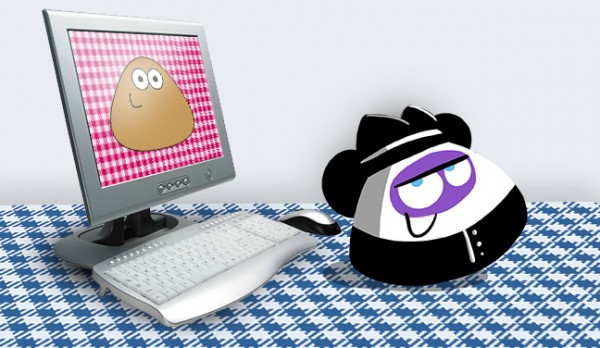These days Pou, a big-eyed triangular character of a name-sake game app, reigns supreme on tablet computers and smart phones. The popularity of this character, which has an innocent look in its eyes, knows no bounds as far as age or gender is concerned.
Why is Pou so lovable? That is the question Dr. Behnam Shariati, a psychiatrist and member of faculty at Iran University of Medical Sciences, has answered in a 165th issue of Zendegi Mosbat (Positive Living) Weekly. The following is an excerpt of the article:
You may have never heard the name of game app Pou. But you have definitely seen many people playing the game on their tablet computers or on their smart phones and at times letting out expressions of love and endearment for the triangular character which appears on your screen and looks you in the eye as it searches for a new parent.
When you adopt Pou, you have to assume all parental responsibilities. Like human babies, the character should be fed, cleaned, exercised, and put to sleep. If you fail to feed Pou in a timely fashion or if you forget other parental responsibilities, Pou protests and reminds you of what should have been done. As you progress, coins can be earned to purchase Pou costumes and decorations and meet its overall needs. You do most of the things a parent should do to satisfy the needs of his/her child.
Why is Pou so lovable?
At first glance, Pou looks like a game which is too slow-motion to create any excitement, a game in which you deal with a small, quiet creature. In fact though, the game is meant to satisfy your emotional needs. This cute creature – whose big eyes elicit everyone’s sympathy and produce good feelings inside them – the innocent look on its face and the smile it wears are all designed to meet part of the gamer’s emotional needs. In other words, by adopting Pou we seek to satisfy the emotional needs that are normally dealt with in our personal relationships. This game has intelligently tapped into the human character and has been able, even though artificially, to meet the emotional needs of the gamers.
It gives you parental responsibilities.
As part of this game, you are supposed to bring up a small creature, feed it, cleanse it, and do other things real parents do. These things evoke a feeling of parenthood in you. At a time when humans are less willing than before to reproduce, the feeling of parenthood is somehow ignored. So this small creature inspires parental feelings in individuals and superficially fills their void. […]
Pou’s popularity knows no age bounds
[…] The feeling of wanting to be a parent is not limited to a certain age. Most probably it is shaped when a child interacts with his/her parents. For instance, from a young age girls like to act as mothers to their dolls. […] Older people too enjoy playing the game, and spend some time daily attending to Pou. The need to act as a parent exists in everyone; when it is not satisfied naturally, individuals opts for alternatives, even if they are digital or electronic.
Why is it that parents love Pou too?
When face-to-face contacts among humans decline, individuals opt for apps such as Viber, WhatsApp, WeChat, etc. When the need for face-to-face contacts is not met, individuals choose digitized games such as Pou to satisfy their needs. That is why you see a stay-home mom develop a liking for this cute creature.
